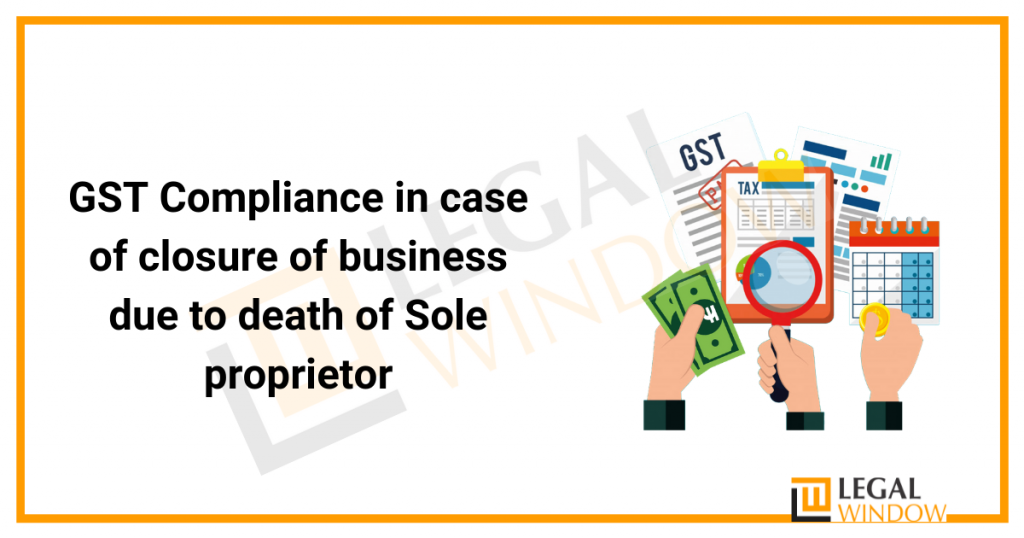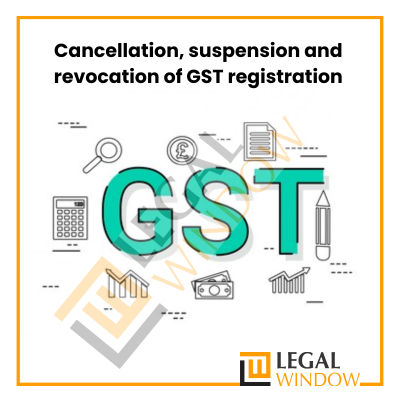GST Compliance in case of closure of business due to death of Sole proprietor
- June 16, 2021
- GST

A Sole Proprietorship is a form of business organization where a business is managed by a single person. Usually, it does not require any registration as such. Any person who wants to start a business with a smaller investment can take this type of business form. The control of the business is solely in the hands of the single proprietor/owner; he owns all the losses of the business and enjoys all the profits. Many local businesses such as grocery stores, parlors, boutiques, retail stores, etc., can be set as a sole proprietorship firm.
The proprietor requires getting the Registration Certificate under the Shops and Establishment Act of the state in which the business is located. The proprietorship requires to get registered under GST law if the business turnover surpasses Rs. 20 lakh or 10 lakh as the case may be.
Now let us discuss about consequences and compliances in case if the sole proprietor dies, Will the GST registration terminates? Or will the business remain under the same GSTIN?
The Board has clarified that transfer in the ownership of the business will include transfer or change in the ownership of business because of the death of the sole proprietor. If a person is running a proprietorship business and he dies due to any reason, then it will be admitted as a transfer of a business.
| Table of Content |
Provisions applicable in case of death of a Sole Proprietor
In the case of the death of the proprietor of a business, these are the two situations that can arise:
- Discontinuation of business
- Proceeding of business by the legal representative of the departed proprietor.
Now let us read about these two situations in detail,
Case 1- Discontinuation of Business or when the legal representative decides to close down the business-
If the legal heir or you can say a legal representative of the deceased person does not plan to continue the business, even in this circumstance he has some liabilities under GST law which he has to comply with,
- Filing of Returns:
First of all, the legal heir has to file all the pending returns of the proprietor and discharge the tax liability for the tax period during which the proprietor has died.
It may be GSTR-1, GSTR-3B, GSTR 4, GSTR 4A, GSTR-9, GSTR-9A, GSTR-9C etc. If these returns remain not filed, late fees, interest, penalty, or in some cases prosecution can also be attracted against the legal heir.
This can be done by visiting www.gst.gov.in and then go to the services tab > returns > track return status, here you can check the current return filing status of the deceased proprietor.
- Cancellation of Registration & Payment of Tax on Available Stock:
Section 29(1) says that the proper officer may, either on his motion or by an application filed by the registered person or by his legal heirs, in case of death of such person, cancel the registration as per the law prescribed under the CGST Act, 2017.
So by this, we can make out if the proper officer did not take any action, then the legal heir of the deceased proprietor shall make an application through the online portal for cancellation of registration in FORM GST REG-16.
Now we see section 29(5) deals with the provision that each registered person whose registration is cancelled shall either by way of debit in the electronic credit ledger or electronic cash ledger pay an amount equivalent to the credit of input tax in respect of inputs held in stock and inputs contained in semi-finished or finished goods held in stock or capital goods or plant and machinery on the day immediately preceding the date of such cancellation or the output tax payable on such goods, whichever is greater.
For this calculation, the stock of inputs, semi-finished goods, finished goods, and capital goods shall be taken as on the day immediately preceding the date w.e.f which the cancellation has been ordered by the proper officer i.e. the date of cancellation of registration.
Transfer of Liability-
So, the legal heir is bound to pay the arrears outstanding against the deceased person in respect of input held in stock, inputs held in semi-finished or finished goods held in stock, or capital goods or plant and machinery by debiting the amount in electronic credit ledger or electronic cash ledger.
The above requirement should not be a prerequisite for applying for cancellation of registration. This can also be done at the time of submission of the final return in FORM GSTR-10. We can say that in any case, once the taxpayer applies for the cancellation of his registration from a specified date, he will not be able to utilize any unused balances in his electronic credit or cash ledgers from the said date except for paying liabilities under GST Act up to the date of filing of final return in FORM GSTR-10.
In case the final return in FORM GSTR-10 is not filed within the specified date, then notice in FORM GSTR-3A is issued to the taxpayer. If the taxpayer even after this fails to file the final return within 15 days of the receipt of the notice, then an assessment order in FORM GST ASMT-13 under section 62 of the CGST Act shall have to be issued to define the liability of the taxpayer under subsection (5) of section 29 based on information available with the proper officer.
If the taxpayer files the final return within 30 days of the date of service of the order in FORM GST ASMT-13, then the said order shall be deemed to have been withdrawn.
Nevertheless, the liability for payment of interest and late fees shall continue.
From where will the Legal heir pay the liability?
Section 93 states that where a person who is liable to pay tax, interest, or penalty dies (the deceased proprietor) than in the case where the business carried on by the person is discontinued, whether before or after his death, his legal representative shall be liable to pay, out of the estate of the deceased that is inherited by him, to the extent to which the estate is capable of meeting the charge whether such tax, interest or penalty has been determined before his death but has continued to be unpaid or is discovered after his death.
What information is necessary for filing a GST Cancellation application?
While beginning the application for cancellation of registration in FORM GST REG-16, the portal requires you to have the following information mandatorily-
- Address for future correspondence along with the mobile number and email address
- Reason for cancellation
- Date from which cancellation is asked
- Details of the last return that is filed by the taxpayer with the ARN of such return
- Details of the value and the input tax/tax payable on the stock of inputs, inputs contained in semi-finished goods, inputs contained in finished goods, stock of capital goods/plant and machinery
In case of death following additional information is required.
- Death certificate of the deceased
- Document for Identity and Address verification of the deceased
- Proof of the business closing
- Proof that bank account is closed (if available)
- Indemnity Certificate
After submission of the application, it appears on the dashboard of the Proper Officer.
As we see the cancellation has no impact on the liability of the taxpayer for any acts of commission/omission performed before or after the date of cancellation, the proper officer should admit all such applications within 30 days from the date of applying, except in the following circumstances:
- The application in FORM GST REG-16 is incomplete which means all the relevant particulars, as detailed above have not been recorded;
- In case of transfer, the new entity in which the applicant intends to amalgamate or merge has not got registered with the tax authority before submission of the application for cancellation. This case perhaps does not relate to our discussion. I have introduced this for the completion of the provision.
In all cases other than those above, the application shall be instantly accepted by the proper officer and the order for cancellation should be issued in FORM GST REG-19 with the effective date of cancellation remaining the same as the date from which the applicant has sought cancellation in FORM GST REG-16.
Remember the effective date cannot be a date earlier than the date of application for the same.
In situations referred to in (a) or (b) in paragraph above, the proper officer shall inform the applicant in writing about the nature of the disparity and give seven working days to the taxpayer to reply, from the date he received the said letter. If no reply is received within the specified period of seven working days, the proper officer may reject the application on the system, after giving a reasonable opportunity of being heard to the applicant and after recording the reasons for rejection.
If the officer is satisfied with the reply, he may approve the application for cancellation and proceed to cancel the registration by issuing an order in FORM GST REG-19.
But if the reply is found to be unsatisfactory, the Officer may reject the application for cancellation after allowing the applicant to be heard.
Case 2 – Legal Heir continues with the same business.
New registration is obtained by the successor:
The successor is required to be registered with effect from the date of such transfer or succession, where a business is transferred to another person for any reasons including the death of the proprietor. While applying FORM GST REG-01 electronically in the common portal and it is to be mentioned that the reason to obtain registration is “death of the proprietor”.
Date of death of the proprietor has to be the date on which liability will arise as on this day the succession has taken place.
While applying for the registration, the death certificate of the deceased is required to be uploaded along with all other formalities required in case of new registration.
What happens to the ITC (Input Tax Credit)?
If the business is continued after the death of the sole proprietor by any person being the successor of the business, it shall be defined as a transfer of business.
The CGST Act states that the registered person is allowed to transfer the unutilized input tax credit that is lying in his electronic credit ledger to the transferee in the manner prescribed in rule 41 of the CGST Rules, where there is a specific provision for transfer of liabilities.
Now we shall discuss about Rule 41
Well, Rule 41 talks about the Transfer of credit on sale, merger, amalgamation, lease, or transfer of a business-
- A registered person shall furnish the details of the transfer of business, in FORM GST ITC-02, electronically on the common portal along with a request for transfer of unutilized input tax credit in his electronic credit ledger to the successor.
- The successor shall also submit a copy of a certificate issued by a practicing chartered accountant or cost accountant certifying that the transfer of business has been done with a specific provision for the transfer of liabilities.
Cancellation of registration
Section 29 of the Act, allows the legal heirs in case of death of proprietor of a business, to file an application for cancellation of registration in FORM GST REG-16 electronically on the common portal on account of transfer of business for any reason including death of the proprietor.
In Form GST REG-16, the reason for cancellation is required to be mentioned as “death of sole proprietor” as also mentioned above.
The GSTIN of the successor to whom the business has been transferred is also required to be notified to link the GSTIN of the transferor with the GSTIN of the transferee i.e. to link GSTIN of proprietor with the successor.
The detailed procedure for applying cancellation is as described below:
As per Rule 20, a registered person, seeking cancellation of his registration under section 29(1) shall electronically apply FORM GST REG-16, including the details of inputs held in stock or inputs contained in semi-finished or finished goods held in stock and of capital goods held in stock on the date from which the cancellation of registration is sought including any liability thereon and the details of the payment, if any, made against such liability and along with the application attach relevant documents in support, at the common portal within thirty days of the occurrence of the event requiring the cancellation.
Transfer of liability
Where a person who is liable to pay tax, interest, or penalty under the CGST Act, dies, in that case, the person who continues business after his death, shall be liable to pay tax, interest, or penalty due from such person under this Act.
It is, therefore the liability of the successor to pay any tax, interest, or any penalty due from the transferor in cases of transfer of business due to the death of the sole proprietor.
Conclusion
If a person is running a proprietorship business and he dies due to any reason, then it will be regarded as a transfer of a business. There can be two situations in case of death of a proprietor. We have tried to cover both cases comprehensively in the above article.
The two cases can be either business discontinued by the legal heir or continuance of business by him; there are four tasks to be taken care of under both the cases.
CA Pulkit Goyal, is a fellow member of the Institute of Chartered Accountants of India (ICAI) having 10 years of experience in the profession of Chartered Accountancy and thorough understanding of the corporate as well as non-corporate entities taxation system. His core area of practice is foreign company taxation which has given him an edge in analytical thinking & executing assignments with a unique perspective. He has worked as a consultant with professionally managed corporates. He has experience of writing in different areas and keep at pace with the latest changes and analyze the different implications of various provisions of the act.
Categories
- Agreement Drafting (23)
- Annual Compliance (11)
- Change in Business (36)
- Company Law (147)
- Compliance (88)
- Digital Banking (3)
- Drug License (3)
- FEMA (17)
- Finance Company (42)
- Foreign Taxation (6)
- FSSAI License/Registration (14)
- GST (117)
- Hallmark Registration (1)
- Income Tax (199)
- Latest News (34)
- Miscellaneous (164)
- NBFC Registration (8)
- NGO (14)
- SEBI Registration (6)
- Section 8 Company (7)
- Start and manage a business (20)
- Startup/ Registration (126)
- Trademark Registration/IPR (40)
Recent Posts
- Understanding the provisions of GST Audit and Adjudication April 20, 2024
- April, 2024 Tax Compliance Tracker: Income Tax & GST Deadlines April 18, 2024
- Managing Director & Whole Time Director in a Private Limited Company April 17, 2024
About us
LegalWindow.in is a professional technology driven platform of multidisciplined experts like CA/CS/Lawyers spanning with an aim to provide concrete solution to individuals, start-ups and other business organisation by maximising their growth at an affordable cost.







